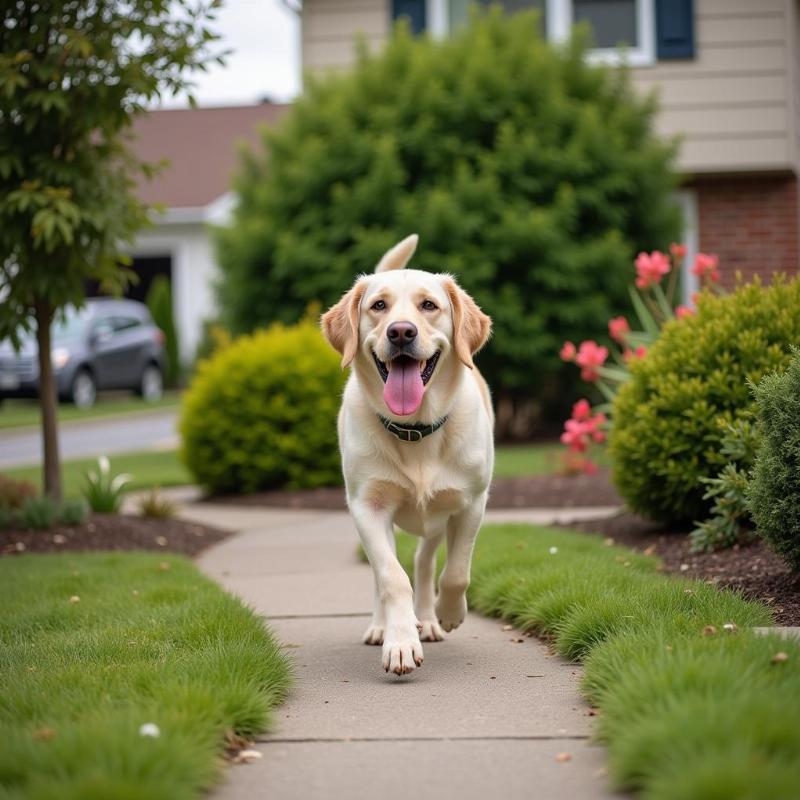Can a dog hold it for 12 hours? The simple answer is: probably not comfortably, and definitely not healthily. While adult dogs might physically be able to hold their bladder and bowels for that long, it’s not recommended and can lead to a variety of health and behavioral issues. This article will dive into the specifics of canine bladder and bowel control, discussing age, breed, health considerations, and training techniques to help you understand what’s best for your furry friend.
Understanding Canine Bladder and Bowel Control
A dog’s ability to “hold it” depends on several factors, including age, size, breed, and overall health. Puppies, for instance, have smaller bladders and less control than adult dogs. A general rule of thumb is that a puppy can hold their urine for one hour for every month of age. So, a three-month-old puppy can likely hold it for about three hours. Senior dogs may also experience decreased bladder control due to age-related changes. Similarly, smaller breeds generally have smaller bladders than larger breeds. Health conditions like urinary tract infections, diabetes, and kidney disease can also impact a dog’s ability to control their bladder and bowels.
The Risks of Holding It for Too Long
Forcing a dog to hold their urine or feces for 12 hours can have negative consequences. These can include urinary tract infections, bladder stones, and even incontinence. In addition, holding bowel movements for extended periods can lead to constipation and discomfort. Beyond the physical health risks, consistently making a dog hold it for extended periods can also lead to behavioral problems such as house soiling accidents. The dog may simply be unable to hold it any longer, leading to accidents inside the house.
How Long is Too Long?
While 12 hours is definitely too long for most dogs, a more reasonable timeframe for adult dogs is typically between 6-8 hours. However, even this can be pushing it for some dogs, especially smaller breeds or those with health issues. Ideally, dogs should have the opportunity to relieve themselves every 4-6 hours. This is especially true for puppies and senior dogs.
 Dog Potty Break
Dog Potty Break
Tips for Managing Your Dog’s Potty Breaks
Managing your dog’s potty breaks effectively requires planning and consistency. Establish a regular potty break schedule tailored to your dog’s age, breed, and health. This could mean taking your dog out first thing in the morning, before bedtime, and several times throughout the day. If you work long hours, consider hiring a dog walker or using a doggy daycare. Crate training can also be helpful, but remember that a crate is not a substitute for regular potty breaks. Never use a crate to force your dog to hold it for excessively long periods.
What if You Have to be Away for 12 Hours?
If you absolutely must be away for 12 hours, consider hiring a pet sitter or asking a trusted friend or family member to let your dog out. Another option is to use a dog walker who can visit your home midday to provide a much-needed potty break. For senior dogs or dogs with medical conditions, a pet sitter who can stay overnight might be the best option.
Conclusion
While some dogs may physically be able to hold it for 12 hours, it’s not healthy or humane to expect them to do so regularly. Prioritizing your dog’s well-being by providing frequent potty breaks will not only prevent potential health issues but also strengthen your bond and create a happier, healthier life for your furry companion. Can a dog hold it for 12 hours? The answer is a resounding no. Provide regular potty breaks and keep your dog healthy and happy.
FAQ
- How long can a puppy hold its bladder? A general rule is one hour for each month of age.
- What if my dog has accidents in the house? Consult with your veterinarian to rule out any underlying medical conditions and seek advice on house-training techniques.
- Is it okay to leave my dog in a crate for 12 hours? No, it’s not recommended. Even adult dogs shouldn’t be crated for that length of time.
- What are the signs of a urinary tract infection in dogs? Frequent urination, straining to urinate, blood in the urine, and accidents in the house.
- How can I help my senior dog with incontinence? Consult your veterinarian for advice on managing incontinence, which may include medication, dietary changes, or special dog diapers.
- Can certain medications affect a dog’s bladder control? Yes, some medications can have this side effect. Always consult with your vet about any potential side effects of medications your dog is taking.
- How can I encourage my dog to eliminate outside? Establish a consistent routine, reward successful potty breaks with praise and treats, and clean up accidents thoroughly to eliminate odors.
Beautdogs.us is your premier online destination for all things dog-related in the United States. We offer expert advice on dog breeds, care, and product recommendations, catering to both novice and experienced dog owners. Our team of dedicated pet professionals is passionate about providing reliable and engaging content to ensure a happy and healthy life for your furry friend. For expert guidance and personalized recommendations, contact us at [email protected] or call us at +1 501-555-7529. Beautdogs.us is committed to providing comprehensive resources for every dog owner.